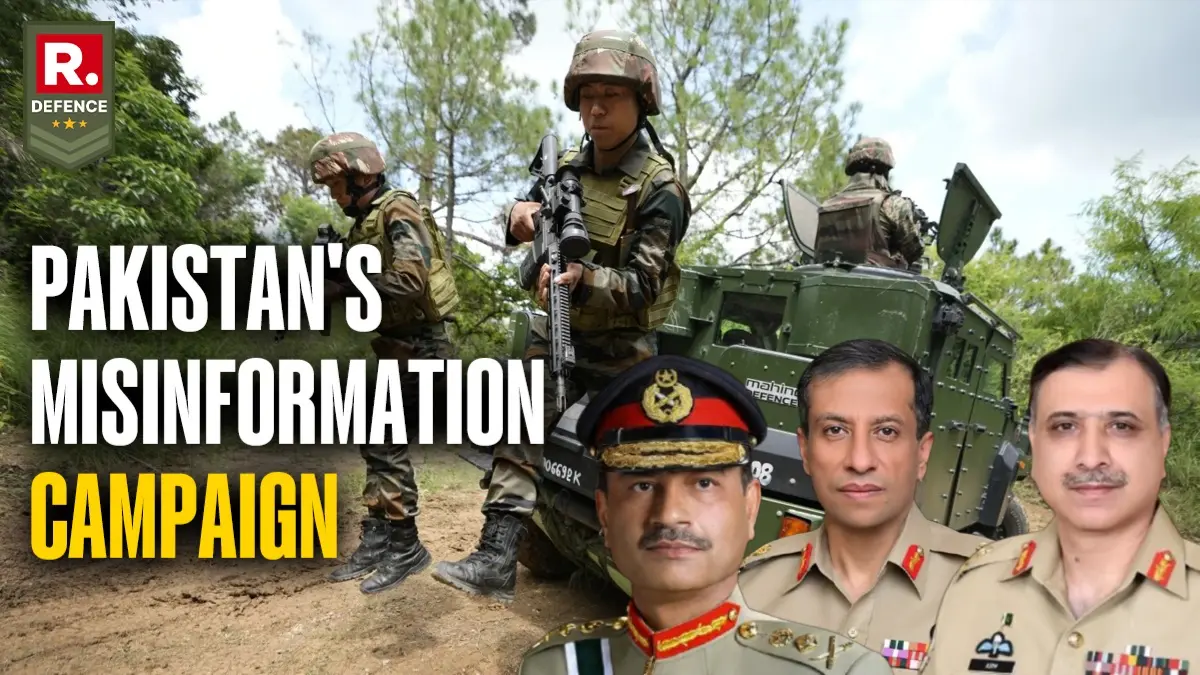Updated 5 May 2025 at 16:57 IST
Pakistan's ISI-Backed Accounts Wage Disinformation War Against India Post-Pahalgam Attack
The Pahalgam terror attack, which killed 26 civilians in J&K, has triggered an unprecedented wave of cross-border misinformation campaign by Pakistan's ISI.
- Defence News
- 5 min read

New Delhi, India - The terrorist attack in Pahalgam, Jammu and Kashmir, on April 22, 2025, which resulted in the deaths of 26 civilians, has not only escalated tensions between India and Pakistan but has also become a focal point for a sophisticated misinformation campaign. This campaign encompasses false claims about Indian Army documents, misleading narratives about army leadership, the use of AI-generated content, propaganda to heighten India-Pakistan tensions, and specific incidents involving impersonation and fabricated footage.
In the wake of the Pahalgam attack, pro-Pakistan social media accounts intensified efforts to spread misinformation by circulating fabricated documents purportedly revealing the Indian Army's preparedness and internal assessments. The Press Information Bureau (PIB) of India has firmly labelled these documents as completely fabricated and part of a deliberate disinformation campaign aimed at compromising national security. The PIB urged the public to rely on official sources, highlighting the potential for such misinformation to erode trust in the Indian Army during a critical period.
Misleading Information on Army Leadership
A significant portion of the misinformation campaign targeted Lt Gen MV Suchindra Kumar, the commander of the Northern Army, responsible for operations in Jammu and Kashmir. Pro-Pakistan social media accounts falsely claimed that Lt Gen Kumar was removed from his post or arrested following the Pahalgam attack, attributing the incident to security lapses. These claims lacked any credible evidence and were part of a broader strategy to discredit Indian military leadership. The Indian government's Press Information Bureau debunked these claims, stating that Lt Gen Kumar was scheduled to retire on April 30, 2025, and that the reports of his removal were fake.

The use of artificial intelligence (AI) in spreading misinformation has become increasingly sophisticated, particularly in the context of the Pahalgam attack. Pakistani social media accounts have been reported to use AI-generated videos to mock the victims and Indian leadership, including Prime Minister Narendra Modi . These videos, shared under trending hashtags like #IndianFalseFlag and #PahalgamDramaExposed, portray the attack as a staged event by India. These videos, often featuring manipulated imagery and audio, aim to radicalize audiences and disrespect the victims, leveraging technology to create convincing yet entirely fabricated content.
Advertisement
Propaganda to Escalate India-Pakistan Tensions
Following the Pahalgam attack, Pakistani media and social media channels circulated alarmist claims that India was planning imminent military action against Pakistan within 24–36 hours. These reports, lacking credible evidence, were part of a disinformation campaign designed to escalate fear and portray India as the aggressor, thereby diverting global attention from Pakistan’s alleged involvement in the attack. Pakistan's Information Minister Attaullah Tarar warned of severe consequences and announced a resolute response to any form of aggression. Defense Minister Khawaja Muhammad Asif emphasized that Pakistan would use its nuclear weapons only if its survival were threatened.

Pakistani Actor Malik Kanji Posing as “Ashok Kumar”: A viral video featuring Malik Kanji, a Pakistani drama artist and homoeopathic doctor, was misrepresented as that of an Indian Army officer named Ashok Kumar. In the video, Kanji expressed doubts about the Pahalgam attack, suggesting it was a false flag operation. Fact-checking by Factly confirmed that the individual is Malik Kanji from Pakistan, not an Indian Army officer, exposing this as a deliberate attempt at impersonation and misinformation.
Advertisement

Pakistan Air Force Using Elon Musk’s SpaceX Footages and Video Games: On April 29, 2025, the Pakistan Air Force released a propaganda video intended to showcase military might. The video was fact-checked and mocked globally after it was revealed to include footage from SpaceX’s Falcon 9 rocket launches, scenes from video games like Call of Duty, and clips of Turkish drones and Russian S-300/S-400 systems, all falsely claimed as Pakistan’s own assets. This incident has made Pakistan a subject of international ridicule, underscoring the reliance on fabricated content to manipulate perceptions.
India Needs Enhanced Cyber Defences
The spread of misinformation following the Pahalgam attack has significant implications for national security, public morale, and international relations. The Indian government has taken proactive measures to counter these efforts, including banning 16 Pakistani YouTube channels on April 28, 2025, for disseminating provocative and communally sensitive content, false narratives, and misinformation against India, its Army, and security agencies. Additionally, the PIB and other official channels have been actively fact-checking and debunking false claims, issuing advisories to the public to rely on verified information.

However, the rapid dissemination of misinformation on social media platforms poses a continuous challenge, requiring enhanced cyber defences and international collaboration to mitigate its impact. The Pahalgam terror attack has not only resulted in a tragic loss of life but has also become a battleground for misinformation, with pro-Pakistan entities employing fabricated documents, false claims about military leadership, AI-generated content, and alarmist propaganda to destabilize India and escalate tensions with Pakistan.
Specific incidents, such as the impersonation by Malik Kanji and the Pakistan Air Force’s use of fake footage, illustrate the lengths to which hostile actors will go to manipulate narratives. As of May 5, 2025, India must continue to prioritize accurate information dissemination, strengthen its cyber capabilities, and work with global partners to combat this evolving threat, ensuring public trust and regional stability are maintained.
Watch - This Is Exclusive: Lashkar Jungle Camp Exposed | Pakistan ISPR’s Web Of Lies Exposed
Published By : Yuvraj Tyagi
Published On: 5 May 2025 at 16:49 IST
